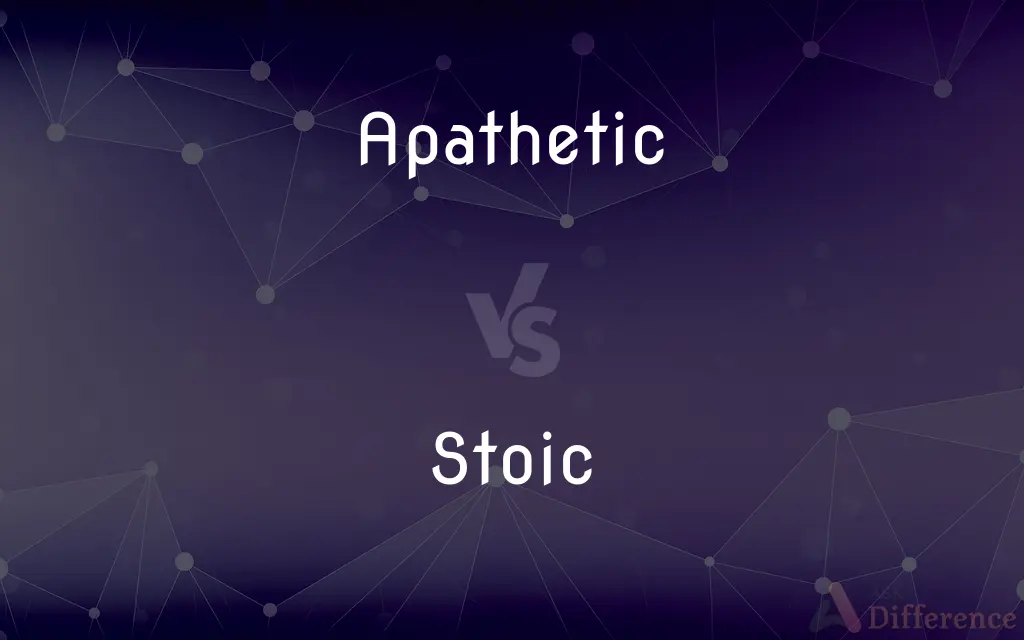Apathetic vs. Stoic — What's the Difference?
By Tayyaba Rehman & Maham Liaqat — Updated on May 7, 2024
Apathetic refers to a lack of interest or emotion toward something, while stoic describes the ability to endure hardship without showing one's feelings.

Difference Between Apathetic and Stoic
Table of Contents
ADVERTISEMENT
Key Differences
Apathetic people show little to no emotional response, appearing indifferent to various situations. Stoic individuals, on the other hand, remain calm and composed in challenging situations but intentionally manage their emotions to appear unaffected.
Apathetic individuals might neglect responsibilities or show little motivation due to indifference. Stoic people, in contrast, actively manage emotions and focus on logic, viewing difficulties as opportunities to practice self-discipline.
Apathetic behavior can stem from disinterest, burnout, or depression, leading to disengagement from social or professional obligations. Stoic behavior is often rooted in a philosophy of self-control, emphasizing rational thinking over emotional responses.
In relationships, apathetic individuals may withdraw from loved ones and provide minimal engagement. Stoic individuals, while calm and composed, often prioritize their principles and responsibilities, sometimes leading others to perceive them as emotionally distant.
While apathy is often regarded negatively for its association with laziness or lack of care, stoicism is usually valued for its focus on personal growth and emotional strength.
ADVERTISEMENT
Comparison Chart
Attitude
Indifferent or unresponsive
Emotionally controlled, logical
Behavior
Avoids involvement or responsibilities
Calmly endures pain or hardship
Emotional Response
Lack of emotion
Suppressed emotion
Origin
Disinterest, burnout, or depression
Philosophy emphasizing self-discipline
Perception
Seen as lazy or uninterested
Seen as emotionally resilient
Compare with Definitions
Apathetic
Showing little interest, enthusiasm, or concern.
The apathetic student ignored the teacher's requests for participation.
Stoic
Enduring pain or hardship without displaying emotion.
He remained stoic during the operation, not showing his discomfort.
Apathetic
Having a lack of emotional response to various stimuli.
After repeated setbacks, she became apathetic about the project.
Stoic
Adhering to the principles of Stoicism, an ancient philosophy promoting rational thought and emotional control.
She followed a stoic approach, calmly facing her challenges.
Apathetic
Unmotivated to act or change due to disinterest.
The team's apathetic response resulted in poor performance.
Stoic
Maintaining composure and resilience in adversity.
The stoic leader guided his team through the crisis without panic.
Apathetic
Demonstrating indifference toward activities or events.
His apathetic attitude toward social gatherings worried his friends.
Stoic
Showing indifference to pleasure or pain by managing responses.
Despite the good news, she stayed stoic, believing that joy would be short-lived.
Apathetic
Showing no energy or motivation.
His apathetic behavior was mistaken for laziness.
Stoic
Suppressing emotions to prioritize rational decisions.
His stoic demeanor hid his true feelings of sadness.
Apathetic
Feeling or showing a lack of interest or concern; indifferent.
Stoic
One who is seemingly indifferent to or unaffected by joy, grief, pleasure, or pain.
Apathetic
Feeling or showing little or no emotion; unresponsive.
Stoic
Stoic A member of an originally Greek school of philosophy, founded by Zeno of Citium about 308 BC, believing that God determined everything for the best and that virtue is sufficient for happiness. Its later Roman form advocated the calm acceptance of all occurrences as the unavoidable result of divine will or of the natural order.
Apathetic
Void of feeling; not susceptible of deep emotion.
Stoic
Seemingly indifferent to or unaffected by pleasure or pain; impassive
"stoic resignation in the face of hunger" (John F. Kennedy).
Apathetic
Of, or pertaining to apatheism.
Stoic
Stoic Of or relating to the Stoics or their philosophy.
Apathetic
Void of feeling; not susceptible of deep emotion; passionless.
Stoic
(philosophy) Proponent of stoicism, a school of thought, from in 300 {{B.C.E.}} up to about the time of Marcus Aurelius, who holds that by cultivating an understanding of the logos, or natural law, one can be free of suffering.
Apathetic
Showing a lack of interest or concern; indifferent.
Stoic
A person indifferent to pleasure or pain.
Apathetic
Showing little or no emotion or animation;
A woman who became active rather than apathetic as she grew older
Stoic
Of or relating to the Stoics or their ideas.
Apathetic
Marked by a lack of interest;
An apathetic audience
The universe is neither hostile nor friendly; it is simply indifferent
Stoic
Not affected by pain or distress.
Stoic
Not displaying any external signs of being affected by pain or distress.
Stoic
A disciple of the philosopher Zeno; one of a Greek sect which held that men should be free from passion, unmoved by joy or grief, and should submit without complaint to unavoidable necessity, by which all things are governed.
Stoic
Hence, a person not easily excited; an apathetic person; one who is apparently or professedly indifferent to pleasure or pain.
A Stoic of the woods, a man without a tear.
Stoic
Of or pertaining to the Stoics; resembling the Stoics or their doctrines.
Stoic
Not affected by passion; manifesting indifference to pleasure or pain; especially, bearing pain, suffering, or bad fortune without complaint.
Stoic
A member of the ancient Greek school of philosophy founded by Zeno;
A Stoic achieves happiness by submission to destiny
Stoic
Someone who is seemingly indifferent to emotions
Stoic
Seeming unaffected by pleasure or pain; impassive;
Stoic courage
Stoic patience
A stoical sufferer
Stoic
Pertaining to Stoicism or its followers
Common Curiosities
Is being stoic the same as being emotionless?
No, stoic individuals feel emotions but intentionally manage them to appear composed.
Is being apathetic always negative?
Often, yes, because it may lead to neglecting important responsibilities or relationships.
How does stoicism differ from indifference?
Stoicism involves active emotional control, while indifference suggests a lack of care or interest.
What does apathetic mean in daily life?
It means showing little interest or care about various activities or issues.
Can apathy be a sign of mental health issues?
Yes, apathy can indicate depression, burnout, or other psychological conditions.
Can someone be both apathetic and stoic?
Rarely, as apathetic people tend to avoid involvement, while stoic people actively engage but control their emotions.
What historical figures practiced Stoicism?
Ancient philosophers like Seneca, Marcus Aurelius, and Epictetus were prominent Stoics.
Why is stoicism valued in difficult times?
Because it promotes logical thinking, emotional resilience, and perseverance through adversity.
Are stoic people incapable of feeling joy?
No, they feel joy but prefer not to indulge excessively, maintaining a balanced mindset.
What causes apathetic behavior?
Factors include depression, burnout, or a perceived lack of control over one's situation.
Can someone recover from apathy?
Yes, with proper support, therapy, or lifestyle changes, people can regain interest and motivation.
How can someone cultivate a stoic mindset?
By focusing on rational thinking, accepting uncontrollable events, and practicing emotional control.
Is stoicism compatible with modern life?
Yes, many of its principles, like focusing on controllable factors, remain relevant for mental health.
Does apathy affect work performance?
Yes, it often leads to poor productivity and disengagement from work tasks.
Is apathy common among teenagers?
Yes, apathy can be common due to developmental changes or social pressures, but should be monitored if severe.
Share Your Discovery

Previous Comparison
Bore vs. Chore
Next Comparison
Vial vs. BottleAuthor Spotlight
Written by
Tayyaba RehmanTayyaba Rehman is a distinguished writer, currently serving as a primary contributor to askdifference.com. As a researcher in semantics and etymology, Tayyaba's passion for the complexity of languages and their distinctions has found a perfect home on the platform. Tayyaba delves into the intricacies of language, distinguishing between commonly confused words and phrases, thereby providing clarity for readers worldwide.
Co-written by
Maham Liaqat















































